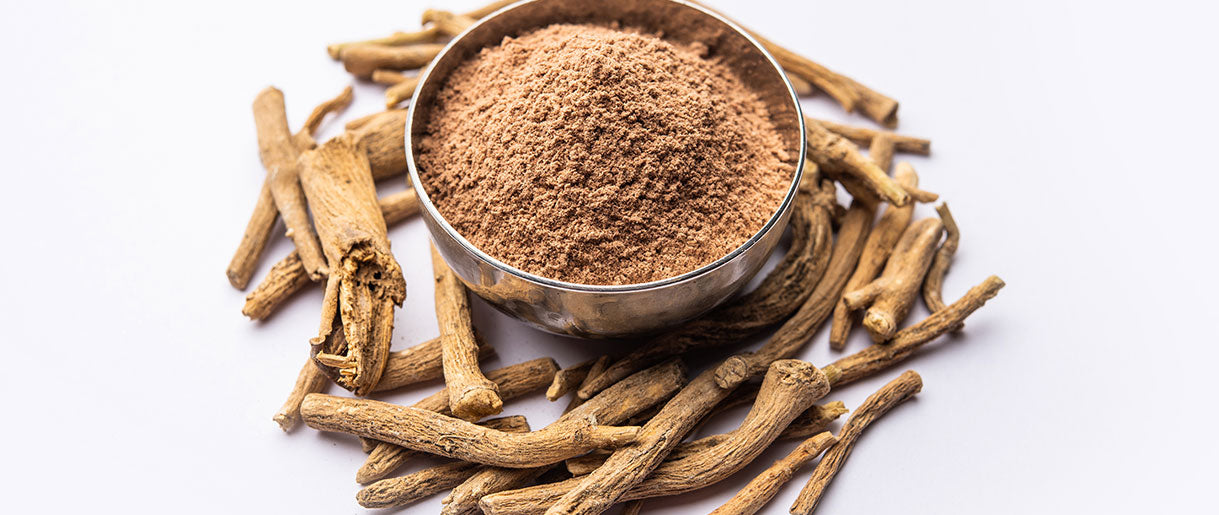Picture this: you're navigating the twists and turns of life, juggling responsibilities, and trying to keep your cool amidst the chaos.
Enter Ashwagandha, an ancient herb that's been a staple in Ayurvedic medicine for centuries. This powerhouse is primarily celebrated for its remarkable ability to reduce stress and anxiety, making it your ultimate ally in the quest for inner peace.
As a powerful adaptogen, it helps you manage stress more effectively, so you can take on whatever life throws your way.
And that's just the beginning—this versatile herb also boosts brain function, increases energy levels, and improves concentration. Talk about a multi-tasker!
The beauty of Ashwagandha lies in its holistic approach to well-being. It's not just about fixing one thing; it's about nurturing your mind, body, and spirit as a whole.
So, buckle up and get ready to dive into the fascinating world of Ashwagandha. As we uncover the multifaceted benefits of this incredible herb, you'll be amazed by the ancient wisdom and modern science that backs up its impressive health benefits.
The Top 11 Benefits of Ashwagandha
1. Fights Stress and Anxiety

Ever feel like stress is your clingy friend who just won't take a hint? Or do you feel like your anxiety is always in the driver's seat?
Enter Ashwagandha, your herbal knight in shining armor, often known as Indian Ginseng.
This ancient herb is like a stress buster from nature's toolkit. Let's break down how it kicks stress and anxiety to the curb:
- Chill Pill Effect: Ashwagandha has a knack for lowering cortisol (1), the pesky stress hormone that often overstays its welcome.
- Brain's Best Buddy: It's not just about feeling less stressed. This herb also helps your brain stay sharp and focused, making stressful situations easier to handle.
And it's not just hearsay; the science backs it up. Studies (2), including those fancy placebo-controlled ones, show that people taking Ashwagandha extract often report feeling more like a Zen master and less like a stress ball.
And here's the cool part: scientific studies (3) have shown that people taking ashwagandha supplements often report feeling less anxious.
It's like giving anxiety a time-out, making this supplement an ideal addition to any morning routine for anxiety.
2. Enhances Cognitive Functions
Brain feeling a bit foggy lately? Here's where Ashwagandha steps in, not just as a stress reliever but also as a brain booster.
This herbal hero might be your ticket to clearer thinking, making it one of the best supplements for brain fog.
- Cognitive Function Lift: Whether it's memory, focus, or processing speed, Ashwagandha is all about giving your cognitive functions (4) a little pep talk.
- Stress and the Brain: Dealing with stress-related disorders? This herb helps by not letting stress mess with your brain's mojo.
Interesting tidbit: Research suggests (5) that Ashwagandha could have some promising effects for folks dealing with conditions like bipolar disorder.
It's linked to better cognitive function, and some studies even dive into how it might influence thyroid hormone concentrations, which are super important for brain health.
3. Improves Sleep Quality

Struggling to catch those Z's? Let's turn the spotlight on Ashwagandha or Withania Somnifera (if you're into scientific names) and see how it might be your ticket to dreamland.
- Snooze Booster: Ashwagandha root extract isn't just for stress; it's like a lullaby for your brain. It's been shown (6) to seriously up your sleep quality game.
- Stress? What Stress?: Since it's a pro at helping to reduce stress, Ashwagandha makes it easier for your mind to wind down at night. Less stress, better rest.
Here's the science bit: in placebo-controlled studies (7), folks taking ashwagandha powder or extract reported sleeping like a baby. Well, maybe not literally, but you get the idea.
4. Increases Energy and Stamina
Feeling more sloth than cheetah lately? Let's talk Ashwagandha for energy.
This herbal supplement isn't just about calming you down—it's also about stepping up your energy and stamina game.
It's a perfect addition to a morning routine for energy, allowing you to increase your energy levels naturally.
- Energizer Herb: Ashwagandha is like your personal cheerleader for physical performance. It's not about a quick energy spike (8); it's more like a steady, enduring boost.
- Stamina, Meet Ashwagandha: Whether you're a gym enthusiast or just trying to keep up with life's marathon, this herb helps keep your energy tank from hitting empty.
We're not only talking muscles here. Evidence suggests Ashwagandha might help balance blood sugar, which is important for maintaining energy levels throughout the day.
5. Boosts Immunity
Ever wish you had a shield to fend off those pesky colds and cases of flu? Say hello to Ashwagandha.
It's not just any dietary supplement; it's like a personal bodyguard for your immune system.
- Immune Warrior: In alternative medicine, Ashwagandha is a star player. It's believed to boost your immune function (9), making it easier for your body to ward off invaders.
- Stress Down, Immunity Up: Since it's a pro at reducing perceived stress, Ashwagandha helps keep your immune system fighting fit. Less stress means a happier immune system.
Now, let's talk evidence. Although more research is always good, what we've seen so far is promising.
Some studies (10) looking at the clinical effectiveness of Ashwagandha suggest it might just be the immune booster we've been looking for.
6. Regulates Blood Sugar Levels

Juggling blood sugar levels can feel like walking a tightrope, right? Well, Ashwagandha might be the safety net you're looking for.
This herb, a staple in traditional medicine, is stepping into the spotlight as a dietary supplement for blood sugar regulation.
- Balancing Act: Ashwagandha may have a knack for keeping those sugar levels in check, making it a potential buddy for anyone monitoring their blood sugar.
- Science Backs It Up: Some solid research (11), including placebo-controlled studies (12), shows that Ashwagandha could help manage blood sugar levels. It's like having a helping hand alongside your regular diabetes medications.
If you're exploring natural ways to complement your diabetes management plan, Ashwagandha might be worth considering.
Just a heads-up—chatting with your healthcare provider is always good, especially when mixing herbs with diabetes medications.
7. Has Cancer-Fighting Properties
Regarding the big C—cancer—we're all ears for anything that might give us an edge. That's where Ashwagandha steps into the spotlight, showing some promising signs as a fighter in the ring against cancer.
- Targeting Hormone-Sensitive Cancers: There's talk in the medical community about Ashwagandha's potential in battling hormone-sensitive prostate cancer (13). It's like this herb has a specific radar for these cells.
- Breast Cancer Research: Ashwagandha might be a beacon of hope for breast cancer patients. Some studies (14) are looking into how this herb could support traditional cancer treatments.
Now, let's be clear—Ashwagandha isn't a cure-all. But its potential to contribute to cancer-fighting strategies is something researchers are getting excited about.
Think of Ashwagandha as part of the support squad, possibly helping to enhance the effectiveness of existing cancer treatments or easing some of their side effects.
8. Improves Heart Health

Heart health is no joke; keeping that ticker happy is a top priority. Enter Ashwagandha, a herbal supplement that might be your heart's new best friend.
- Heart Helper: Ashwagandha is gaining traction as a heart-healthy herb. It's like having a personal trainer for your heart, working to keep it strong and steady.
- Placebo-Controlled Studies Speak Volumes: The real deal-sealer? Placebo-controlled studies are showing some promising results (15). Participants taking Ashwagandha seem to have better heart health markers compared to those who don't.
What does this mean for you and your heart? Well, Ashwagandha might help keep things like cholesterol and blood pressure in check—two biggies regarding heart health.
9. Regulates Thyroid Function
Navigating thyroid issues can feel like a never-ending rollercoaster, right? Here's where Ashwagandha might come into play, offering a natural twist to thyroid function regulation.
- Thyroid Hormone Balancer: Ashwagandha has been catching eyes for its potential role in tweaking thyroid hormones (16) to just the right levels.
- No More Ups and Downs: Whether on thyroid hormone medications or just monitoring your thyroid health, Ashwagandha could be a natural ally in keeping those hormone levels steady.
It's not just about replacing thyroid hormone pills, though. Ashwagandha is more like a supportive friend, potentially enhancing the effectiveness of existing treatments and helping your body find its hormonal balance.
10. Improves Sexual Function and Fertility
Looking to spice up your love life or boost fertility? Let's chat about Ashwagandha.
This isn't just any herbal supplement; it's like a secret weapon from traditional medicine for enhancing your romantic well-being.
- Boosting Testosterone: Ashwagandha is like a natural testosterone tuner for the gents, with studies supporting its ability to boost libido in men (17). It's known for giving those testosterone levels a nudge in the right direction.
- Stress? Not in the Bedroom: By reducing stress, Ashwagandha can indirectly pep up your sexual function. Less stress equals more room for romance.
Ashwagandha isn't just about upping the ante in the bedroom; it's also about its hormonal and vitality effects (18). It's like giving your fertility (19) a helping hand, naturally.
11. Helps with Pain and Inflammation

Got aches and pains that just won't quit? It's time to talk about Ashwagandha, not just your average herbal supplement but a potential warrior against inflammation and pain.
- Nature's Anti-Inflammatory: Ashwagandha is a natural option for soothing those inflammatory (20) woes. It's like a cool compress but in herb form.
- Arthritis's Adversary: Especially for those battling rheumatoid arthritis (21), this herb could be a game-changer. It's been seen as a helpful ally in reducing joint pain and stiffness.
Think of Ashwagandha as a double agent. It's not just about calming inflammation; it also offers some pain relief. That's right, it might help take the edge off that nagging pain.
How to Effectively Use Ashwagandha

Are you ready to unlock the potential of Ashwagandha and experience its life-changing benefits? Let's dive into the nitty-gritty of how to incorporate this ancient herb into your daily routine!
First things first: supplements. Ashwagandha supplements come in various forms, including capsules, powders, and liquid extracts. It's like choosing your own adventure—pick the one that suits your lifestyle and preferences best.
Capsules are convenient and easy to swallow, while powders can be mixed into your favorite smoothies or drinks for a quick and tasty boost.
Liquid extracts, on the other hand, offer a more concentrated dose and can be taken directly or added to beverages.
Now, let's talk dosage. The typical recommended dosage of Ashwagandha is between 300 to 500 milligrams per day.
It's crucial to start with a lower dose and gradually increase it to assess your tolerance and avoid any potential side effects. Remember, it's not a race—slow and steady wins the wellness game!
But when should you take Ashwagandha to maximize its benefits? The answer is simple: consistency is key.
Aim to take your Ashwagandha supplement at the same time each day, preferably with meals to enhance absorption.
Some people find that taking it in the morning helps them start the day with a calm and focused mind, while others prefer taking it before bedtime to promote restful sleep. Listen to your body and find what works best for you.
It's important to note that while Ashwagandha is generally safe, it's always wise to consult with a healthcare professional before starting any new supplement regimen, especially if you have pre-existing medical conditions or are taking medications.
FAQs About Ashwagandha Benefits
How Long Do Ashwagandha Results Take?
The time it takes to see results from Ashwagandha varies.For stress and anxiety, some may notice improvements within a few weeks, while hormonal balance, energy, or sleep improvements could take a few months.
The effectiveness depends on dosage, consistency, and individual body responses. Clinical studies often suggest a 6 to 12-week period to observe significant changes.
Who Should Avoid Ashwagandha?
Ashwagandha should be used cautiously or avoided by certain individuals. Pregnant and breastfeeding women are advised against using it due to potential risks. People with autoimmune diseases, such as rheumatoid arthritis or lupus, should be cautious as Ashwagandha can stimulate the immune system.
Those with thyroid disorders need to consult a healthcare provider before use, as it can affect thyroid hormone levels. Individuals on medications, particularly for thyroid, diabetes, or hypertension, should be aware of possible drug interactions. It's also not recommended for people with stomach ulcers due to its potential gastrointestinal irritation.
Before surgery, it's advisable to stop taking Ashwagandha to avoid its effects on blood sugar and pressure. Finally, the safety of Ashwagandha for children has not been well established, so its use in pediatric populations is generally not recommended.
How Does Ashwagandha Make You Feel?
Ashwagandha, an adaptogenic herb, is known for its ability to help the body manage stress and promote overall well-being. When taking Ashwagandha, many people report a noticeable reduction in stress and anxiety, leading to a sense of calm and relaxation.
It's also common to experience an uplift in mood and mental well-being, possibly due to its stress-reducing properties. Physically, users often note increased energy and stamina, making them feel more vigorous and less tired in their daily activities.
Another significant effect of Ashwagandha is on sleep quality; many find that it helps them sleep better, resulting in feeling more rested and refreshed upon waking. Additionally, some users report enhanced cognitive functions, like improved focus and clarity of thought, making them feel more mentally alert.
Key Takeaways
Ashwagandha isn't just another herbal supplement on the shelf; it's a powerhouse of wellness packed into nature's capsule. From calming your mind and easing stress to boosting your energy and sharpening your cognitive abilities, it's like having a personal wellness coach at your disposal.
Its potential benefits in regulating sleep, enhancing mood, and even supporting more severe health concerns like hormonal imbalances and immune function make it a formidable ally in your health arsenal.
But here's the kicker—Ashwagandha isn't a magic bullet. It's part of a holistic approach to health, a natural piece of a larger wellness puzzle that includes a balanced diet, regular exercise, and mindful living. Its real power lies in its ability to complement your lifestyle, subtly working in the background to enhance your overall well-being.
Feeling intrigued or have a story to share about your experience with Ashwagandha? We'd love to hear from you! Drop a comment below to join the conversation.
References
- Adaptogenic and Anxiolytic Effects of Ashwagandha Root Extract in Healthy Adults: A Double-blind, Randomized, Placebo-controlled Clinical Study, (1), https://www.ncbi.nlm.nih.gov/pmc/articles/PMC6979308/
- An investigation into the stress-relieving and pharmacological actions of an ashwagandha (Withania somnifera) extract, (2), https://www.ncbi.nlm.nih.gov/pmc/articles/PMC6750292/
- A Prospective, Randomized Double-Blind, Placebo-Controlled Study of Safety and Efficacy of a High-Concentration Full-Spectrum Extract of Ashwagandha Root in Reducing Stress and Anxiety in Adults, (3), https://www.ncbi.nlm.nih.gov/pmc/articles/PMC3573577/
- Effects of Acute Ashwagandha Ingestion on Cognitive Function, (4), https://www.ncbi.nlm.nih.gov/pmc/articles/PMC9565281/
- Subtle changes in thyroid indices during a placebo-controlled study of an extract of Withania somnifera in persons with bipolar disorder, (5), https://pubmed.ncbi.nlm.nih.gov/25624699/
- Clinical evaluation of the pharmacological impact of ashwagandha root extract on sleep in healthy volunteers and insomnia patients: A double-blind, randomized, parallel-group, placebo-controlled study, (6), https://pubmed.ncbi.nlm.nih.gov/32818573/
- Effect of Ashwagandha (Withania somnifera) extract on sleep: A systematic review and meta-analysis, (7), https://www.ncbi.nlm.nih.gov/pmc/articles/PMC8462692/
- An Overview on Ashwagandha: A Rasayana (Rejuvenator) of Ayurveda, (8), https://www.ncbi.nlm.nih.gov/pmc/articles/PMC3252722/
- Immunomodulatory Effect of Withania somnifera (Ashwagandha) Extract-A Randomized, Double-Blind, Placebo Controlled Trial with an Open Label Extension on Healthy Participants, (9), https://pubmed.ncbi.nlm.nih.gov/34441940/
- The immunomodulatory role of withania somnifera (L.) dunal in inflammatory diseases, (10), https://www.frontiersin.org/articles/10.3389/fphar.2023.1084757/full
- Protective effects of Withania somnifera root on inflammatory markers and insulin resistance in fructose-fed rats, (11), https://www.ncbi.nlm.nih.gov/pmc/articles/PMC4757043/
- Hypoglycaemic and Hypolipidaemic Effects of Withania somnifera Root and Leaf Extracts on Alloxan-Induced Diabetic Rats, (12), https://www.ncbi.nlm.nih.gov/pmc/articles/PMC2695282/
- Withania somnifera: from prevention to treatment of cancer, (13), https://www.ncbi.nlm.nih.gov/pmc/articles/PMC4899165/
- Keeping abreast about Ashwagandha in breast cancer, (14), https://pubmed.ncbi.nlm.nih.gov/33359916/
- Ashwagandha (Withania somnifera)—Current Research on the Health-Promoting Activities: A Narrative Review, (15), https://www.ncbi.nlm.nih.gov/pmc/articles/PMC10147008/
- Efficacy and Safety of Ashwagandha Root Extract in Subclinical Hypothyroid Patients: A Double-Blind, Randomized Placebo-Controlled Trial, (16), https://pubmed.ncbi.nlm.nih.gov/28829155/
- Effect of standardized root extract of ashwagandha (Withania somnifera) on well‐being and sexual performance in adult males: A randomized controlled trial, (17), https://www.ncbi.nlm.nih.gov/pmc/articles/PMC9297375/
- Clinical Evaluation of the Spermatogenic Activity of the Root Extract of Ashwagandha (Withania somnifera) in Oligospermic Males: A Pilot Study, (18), https://www.ncbi.nlm.nih.gov/pmc/articles/PMC3863556/
- Effects of Withania somnifera on Reproductive System: A Systematic Review of the Available Evidence, (19), https://www.ncbi.nlm.nih.gov/pmc/articles/PMC5833251/
- Ashwagandha (Withania somnifera)—Current Research on the Health-Promoting Activities: A Narrative Review, (20), https://www.ncbi.nlm.nih.gov/pmc/articles/PMC10147008/
- A randomized, double blind placebo controlled study of efficacy and tolerability of Withaina somnifera extracts in knee joint pain, (21), https://www.ncbi.nlm.nih.gov/pmc/articles/PMC5052364/










Let Us Know Your Comments